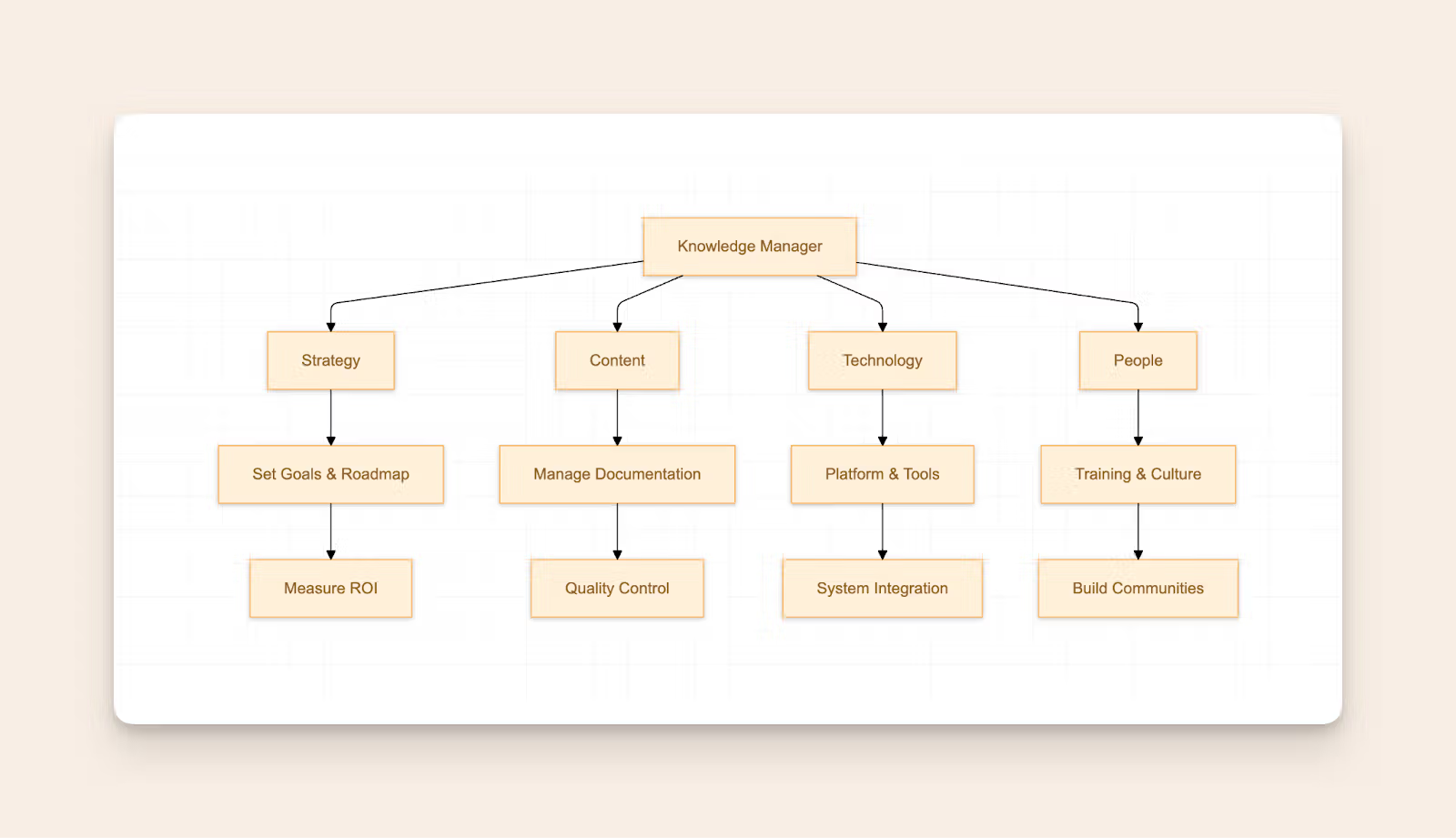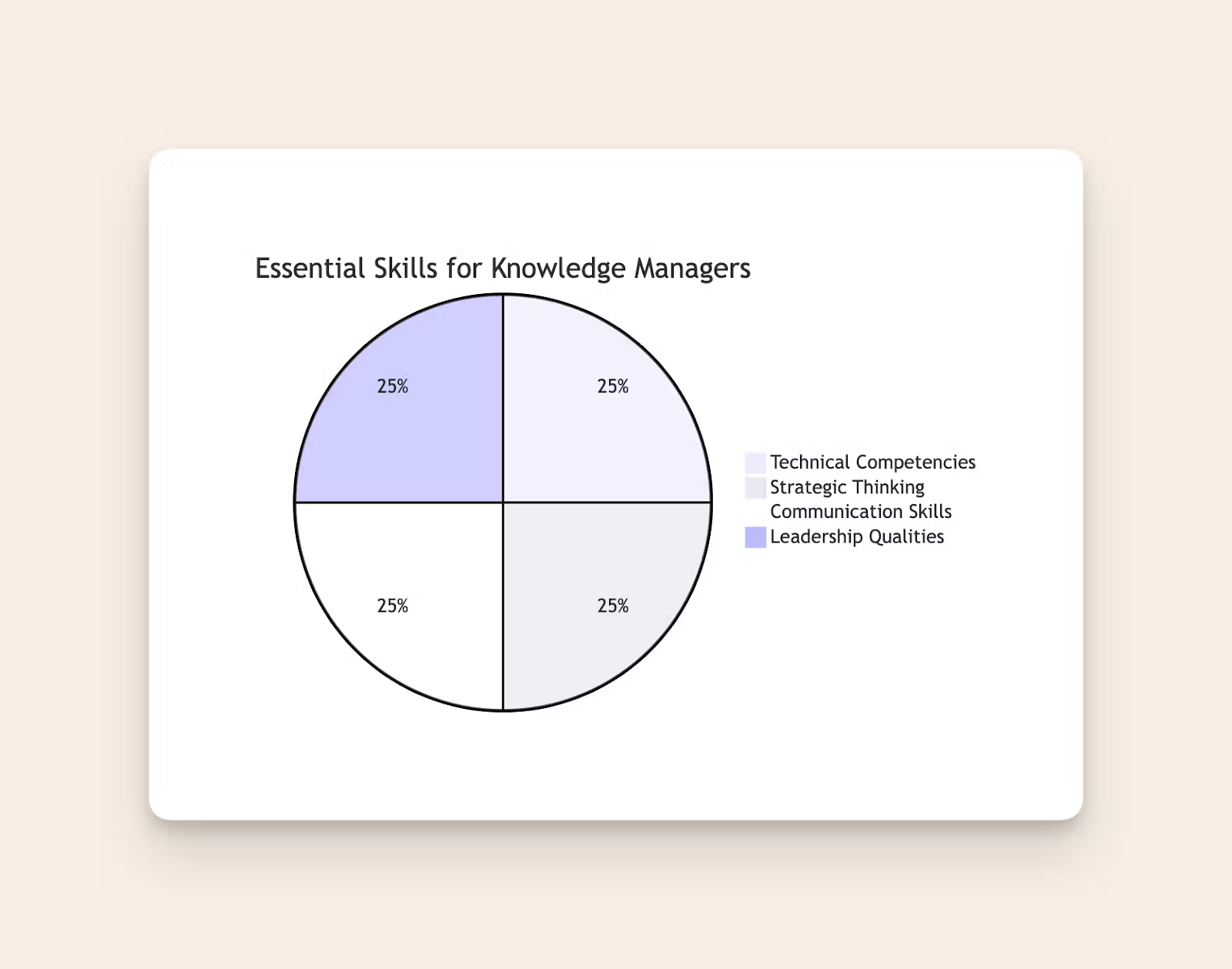Wondering how to become a knowledge manager? You’ll need to master certain skills, gain relevant experience, and follow a strategic educational path. This article outlines the steps to guide you from understanding the role to excelling in it. Read on to discover how to take your first steps toward a career in knowledge management.
Understanding Knowledge Management
Managing knowledge within an organization entails a disciplined methodology to capture, disseminate, and exploit knowledge to boost the entity’s performance and innovative capacity. In this era of abundant information, adeptly handling knowledge provides an enterprise with a noteworthy edge over competitors. The universal relevance of knowledge management across sectors underscores its significance in achieving business excellence and opens up substantial prospects for career progression through a robust knowledge management framework.
Central to effective knowledge management are various processes such as:
- Identifying
- Gathering
- Evaluating
- Distributing
- Implementing
- Continually generating new insights
These steps guarantee that critical data is not only reachable but also actionable, propelling sound strategic choices and promoting creative advancement within organizations—underscoring why understanding these essential components is vital for comprehending what it means to be a Knowledge Manager.
An efficient approach to managing organizational know-how facilitates seamless information flow while capturing the nuances of both tacit and explicit forms of wisdom—the former being implicit understandings acquired from experience while the latter encompasses articulated know-how easily communicable among personnel—which together constitute an integral part of any comprehensive knowledge management framework designed for managing intellectual capital effectively.
Definition and Job Description
A Knowledge Manager is a professional dedicated to overseeing and maintaining an organization’s knowledge base. Their primary role involves capturing, organizing, and sharing knowledge within the organization to ensure that all employees have access to the information they need to perform their jobs effectively. The job description of a Knowledge Manager typically includes developing and implementing a comprehensive knowledge management strategy, creating and maintaining a robust knowledge base, and facilitating knowledge sharing and collaboration among employees.
Knowledge Managers are responsible for identifying key knowledge assets, such as documents, policies, procedures, and best practices, and ensuring these are easily accessible to all relevant stakeholders. They also play a crucial role in fostering a culture of continuous learning and knowledge sharing, which is essential for organizational growth and innovation. By leveraging various tools and methodologies, Knowledge Managers ensure that knowledge is not only captured but also effectively disseminated across the organization.
Importance of Knowledge Managers
Knowledge Managers play a pivotal role in organizations by ensuring that knowledge is captured, organized, and shared effectively. They help create a knowledge-driven culture where information flows seamlessly, enabling employees to access the knowledge they need to perform their jobs efficiently. This, in turn, leads to improved organizational efficiency, innovation, and decision-making.
By implementing effective knowledge management strategies, Knowledge Managers can significantly enhance the overall performance of an organization. They ensure that valuable knowledge is not lost but is instead continuously updated and made available to those who need it. This proactive approach to managing knowledge assets helps organizations stay competitive and responsive to changing market conditions.
Benefits of Hiring a Knowledge Manager
Hiring a Knowledge Manager can bring numerous benefits to an organization, including:
- Improved Access to Information and Knowledge: Ensuring that all employees have easy access to the information they need.
- Enhanced Collaboration and Knowledge Sharing: Facilitating better communication and cooperation among employees.
- Increased Efficiency and Productivity: Streamlining processes and reducing the time spent searching for information.
- Better Decision-Making: Providing accurate and timely information to support strategic decisions.
- Improved Innovation and Competitiveness: Encouraging the sharing of ideas and best practices to drive innovation.
- Enhanced Employee Engagement and Retention: Creating a culture of continuous learning and development.
By focusing on these areas, Knowledge Managers can help organizations achieve their strategic goals and maintain a competitive edge in their industry.
The Role of a Knowledge Manager
Within an organization, a knowledge manager's role directs the implementation and oversight of knowledge management initiatives. Their mission is to facilitate efficient dissemination of pertinent information to the right people when needed, thereby amplifying organizational effectiveness. This involves perpetual scrutiny and enhancement of these strategies so that they stay in harmony with corporate objectives—a responsibility highlighted within both the job description for a knowledge manager and their defined role. In this domain, knowledge managers are pivotal.
A central duty for knowledge managers is optimizing systems designed for new knowledge acquisition and systematic information arrangement. They oversee who gains entry to sensitive files, preserving confidentiality and data integrity by restricting access only to those permitted—key tasks underscored in a typical knowledge manager job description. By advocating cooperation among various sectors within the company, they enhance collective efficiency while cultivating sharing practices amongst staff members. Thus playing an indispensable role.
Knowledge managers implement platforms related to managing organizational wisdom effectively facilitating interaction with crucial data points through systems tailored to learning management needs. Utilizing tools such as storytelling or mapping out intellectual assets enables them not only capture elusive tacit insights but also transform it into clearly articulated explicit know-how via structured processes known as “knowledge capture”. Leading practice communities nurture formalized exchanges alongside impromptu collaborations essential for progressive development.

Essential Skills for Knowledge Managers
A successful knowledge manager requires a distinct combination of capabilities. Essential communication skills facilitate effective dissemination and collaboration across various departments. Project management competencies are crucial for effectively orchestrating and guiding the initiatives related to knowledge management. An ability to strategically capture tacit knowledge is imperative for generating significant insights.
The requisite skill set divides into three primary categories: communication aptitude, project management expertise, and technical acumen. Mastery in each of these domains is indispensable for a knowledge manager tasked with navigating the multifaceted challenges presented by the realm of knowledge management.
We shall delve deeper into each key area that underpins these critical abilities necessary for a proficient knowledge manager.
Communication Skills
Possessing robust communication skills is crucial for knowledge managers. Such skills enhance teamwork and synergy, driving cooperative efforts across various groups. Effective networking with key stakeholders strengthens collaborative bonds and guarantees seamless transfer of knowledge throughout the enterprise. Trust serves as a cornerstone within these interactions, laying the groundwork for supportive collaboration.
For knowledge managers, it’s imperative to pinpoint and engage with key stakeholders. These engagements grant entry to critical information and bolster the spread of knowledge among different sections of an organization. By honing strategic communicative approaches and guiding less experienced team members, they cultivate a cooperative atmosphere that elevates organizational efficiency as a whole.
Project Management Skills
The ability to manage projects proficiently is crucial for knowledge managers, as it empowers them to guide endeavors and secure punctual completion. Proficiency in project management entails strategizing, structuring activities, and allocating tasks adeptly to control procedures and reach objectives. These competencies allow the simultaneous juggling of numerous initiatives while maintaining coherence with company aims.
Expertise in project management bolsters cross-functional teamwork and adeptness at change management—key elements essential for effectuating knowledge management tactics effectively. Adhering to established best practices while enhancing cooperative efforts leads to relentless enhancement and novelty within entities.
Technical Proficiency
Knowledge managers possess the technical expertise necessary to administer and disseminate information throughout an organization efficiently. Their adeptness in using content management systems and leveraging collaborative technologies aids in promoting knowledge sharing, making certain that all staff members have easy access to vital information. Remaining up-to-date with cutting-edge tools and practices is a crucial component of their proficiency in the realm of knowledge management.
The utilization of digital tools and collaborative solutions significantly improves communication within teams as well as the effectiveness of projects. Such technological savvy permits not only the establishment but also ensures consistent upkeep of comprehensive knowledge management frameworks, which align with organizational aims to boost productivity overall.
Educational Pathways
Managing knowledge within an organization entails a disciplined methodology to capture, disseminate, and exploit knowledge to boost the entity's performance and innovative capacity. In this era of abundant information, adeptly handling knowledge provides an enterprise with a noteworthy edge over competitors. The universal relevance of knowledge management across sectors underscores its significance in achieving business excellence and opens up substantial prospects for career progression through a robust knowledge management framework.discover all about Open edX, a widely used open-source platform that powers online education and corporate training worldwide.
Achieving certifications like that of a Certified Knowledge Manager (CKM) can notably bolster one’s professional reputation and perceived expertise. These qualifications showcase an individual’s specialized skills and dedication to their craft while imparting practical strategies and vital insights necessary for adept performance in knowledge management roles.
To keep abreast with ongoing shifts within the field and secure their competitive edge, professionals must engage regularly in learning new advancements and seek opportunities for expanding their skill set throughout their careers.
Gaining Relevant Experience
For those aiming to become proficient knowledge managers, possessing applicable work experience is paramount for adeptly managing best practices. Involvement in tasks associated with project management or technical writing can greatly improve one’s expertise and comprehension of KM initiatives. Direct exposure through internships or capstone projects offers practical learning experiences that are frequently a prerequisite in certain educational programs.
Forging connections with key stakeholders and engaging in activities dedicated to knowledge sharing is crucial for acquiring pertinent experience. Networking serves as a platform to exchange insights and disseminate best practices among various disciplines, enhancing cooperative efforts and encouraging ongoing enhancement of skills.
Internships and Entry-Level Positions
Gaining practical experience in knowledge management is crucial, and internships as well as entry-level positions play a pivotal role in this. These opportunities give individuals insight into the inner workings of organizational processes and key KM practices, serving as an excellent starting point for those who wish to become knowledgeable managers. Through internships, one can gain valuable hands-on exposure to various KM activities and learn directly from experienced professionals.
Embarking on an entry-level career path allows aspiring individuals to delve deeper into the complexities of knowledge management while honing their abilities to manage knowledge effectively. Such roles typically involve collaboration with different departments across an organization, giving new entrants a comprehensive view of how knowledge circulates within such structures.
Building Relationships with Key Stakeholders
Fostering relationships with essential stakeholders enhances cooperation and encourages the exchange of knowledge. By interacting with representatives from different departments, KM objectives can be synchronized with the broader goals of the organization, promoting a unified strategy for managing knowledge. Networking with crucial stakeholders allows for the collection of valuable insights and dissemination of best practices, which bolsters leadership in implementing KM initiatives.
Engaging effectively with stakeholders is critical to fostering cross-functional collaboration—an element that is fundamental to successful KM strategies. Collaborating intimately with these key players aids in pinpointing potential areas needing enhancement and propels ongoing innovation throughout the organization.
Continuous Learning and Certifications
Continuous education and career growth are crucial for knowledge managers to remain relevant in the domain. By participating in various training programs and workshops, employees are motivated to nurture a culture that values constant learning, enhancing their skills within Knowledge Management (KM). Obtaining professional credentials in KM can notably boost both proficiency and employment opportunities.
Securing qualifications such as the Certified Knowledge Manager (CKM) highlights dedication to advancing one’s professional abilities while providing valuable practical insights and techniques vital for proficient KM practice. Keeping abreast of sector progressions through relevant certifications is key for sustaining an advantage over competitors.

Developing a Knowledge Management Strategy
Establishing a knowledge management (KM) strategy begins by pinpointing the specific needs within an organization and addressing key challenges that need to be solved through effective knowledge management processes. It is crucial to create SMART objectives that not only sync with achievable outcomes but also align with wider organizational goals. To execute KM initiatives effectively, it is important to have a team in place where each member knows their particular responsibilities.
Encouraging a culture of sharing knowledge can significantly boost employee engagement and their willingness to share what they know. Offering incentives for employees who actively contribute creates an environment ripe for collaboration, leading to ongoing enhancements in processes and practices. Utilizing platforms like Confluence merges project management capabilities with KM efforts, centralizing company intelligence which bolsters productivity and smoothens collaborative efforts.
A comprehensive KM strategy has the potential to cut down on operational expenses while simultaneously boosting customer satisfaction through improved accessibility of relevant information. Ensuring alignment between individual career aspirations and the strategic direction of organizational knowledge fosters personal growth while contributing towards achieving larger corporate aims, propelling collective success forward.
Knowledge Capture and Organization
Knowledge capture and organization are critical components of a Knowledge Manager’s role. This involves identifying, capturing, and organizing knowledge assets, such as documents, policies, procedures, and best practices. Knowledge Managers use various tools and methodologies, such as knowledge mapping, taxonomy, and metadata, to categorize and make knowledge assets easily accessible.
Effective knowledge capture ensures that valuable information is not lost and can be leveraged to improve organizational processes and decision-making. By organizing knowledge assets systematically, Knowledge Managers make it easier for employees to find and use the information they need, thereby enhancing overall productivity and efficiency.
Knowledge Sharing and Collaboration
Knowledge sharing and collaboration are essential aspects of a Knowledge Manager’s role. This involves creating a culture of knowledge sharing and collaboration among employees and providing the necessary tools and platforms to facilitate this process. Knowledge Managers use various collaboration tools, such as wikis, blogs, and social networks, to enable employees to share knowledge, ideas, and best practices.
By fostering an environment where knowledge is freely shared, Knowledge Managers help break down silos and encourage cross-functional collaboration. This not only improves the flow of information but also drives innovation and continuous improvement within the organization. Effective knowledge sharing ensures that all employees are well-informed and can contribute to the organization’s success.
Tools and Technologies for Knowledge Managers
Technology is a key driver in the realm of knowledge management, enhancing the ability to capture, organize, and retrieve information. Proficiency with content management systems and tools that promote collaboration bolsters the sharing of knowledge and ensures it can be accessed easily. Implementing suitable software for a knowledge management system aids in both preserving knowledge and making it available when needed.
Knowledge managers must master an array of KM instruments like content and document management platforms to adeptly handle information. The integration of collaborative technologies furthers efficient team interactions and project workflow, thereby playing a critical role in executing an effective KM strategy.
While traditional Content Management Systems (CMS) provide straightforward options for publishing digital material online, modern knowledge managers increasingly need tools that can search across multiple platforms simultaneously. Super.work, developed by the team behind Slite, represents the evolution of knowledge management technology by connecting all business tools into one searchable interface. Instead of managing separate systems, knowledge managers can use Super to enable natural language queries across Slack, Google Drive, Linear, GitHub, and 20+ other platforms, making organizational knowledge truly accessible regardless of where it's stored.

Book a demo to see how Super can transform your knowledge management toolkit.
Measuring Success in Knowledge Management
Monitoring multiple metrics and key performance indicators (KPIs) is essential in gauging the effectiveness of knowledge management programs. These measures offer definitive evidence concerning the profitability of KM initiatives, allowing for an evaluation of strategic efficacy and pinpointing opportunities for refinement. Organizations benefit from consistently reviewing KM metrics to ensure perpetual enhancement of their knowledge procedures.
By examining activity metrics that capture both the quantity and caliber of knowledge contributions, alongside performance metrics that scrutinize how content is engaged with to assess its pertinence and impact, knowledge managers are equipped to evaluate the influence exerted by KM endeavors. Consequently, they can establish objectives aimed at persistent progress and alignment with overarching strategies.
Common Challenges and Solutions
Knowledge managers often face challenges like lack of strategy, leadership, and employee participation. Employee contributions and perceived lack of time to document knowledge can stall KM initiatives. Management commitment is critical; if leadership does not model knowledge-sharing, employees are less likely to engage.
Resistance to change and outdated technology can impede KM efforts. Ensuring that information is structured properly and has a powerful search function can help employees access knowledge more easily.
Investigating the usability of content and improving participation in the knowledge base are essential steps to overcoming these challenges.
Career Advancement Tips
In the field of knowledge management, forging connections with pivotal stakeholders is crucial for progressing one’s career since it fosters opportunities for cooperation and guidance. By establishing objectives focused on innovation, those in knowledge manager roles can spearhead critical projects that include crafting novel frameworks and integrating cutting-edge technology. Continually evaluating consumer insights and industry trends enables these professionals to tailor their strategies to meet corporate demands while maintaining relevance and influence.
Cultivating an environment dedicated to perpetual education and keeping abreast of the latest best practices in the sector affords a competitive advantage. Knowledge managers equipped with proficient communication abilities, an understanding of business growth principles, and interpersonal competencies are well-positioned to successfully guide KM initiatives toward bolstering organizational triumphs.
Summary
The path to becoming a Knowledge Manager starts with curiosity about how organizations learn and grow. While some begin in IT or content management, others drift in from business analysis or project management - all united by an interest in making information work better for people.
Think of it as being the librarian of the digital age, minus the constant shushing. Organizations need professionals who can make sense of their collective knowledge, and the demand keeps growing as companies realize they should probably know where their important stuff is.
If this sounds like your cup of tea (or coffee, we don't judge), start by exploring some hands-on roles in content or information management. Add a dash of certification when ready, and you'll be well on your way to helping organizations turn their information chaos into clarity.

